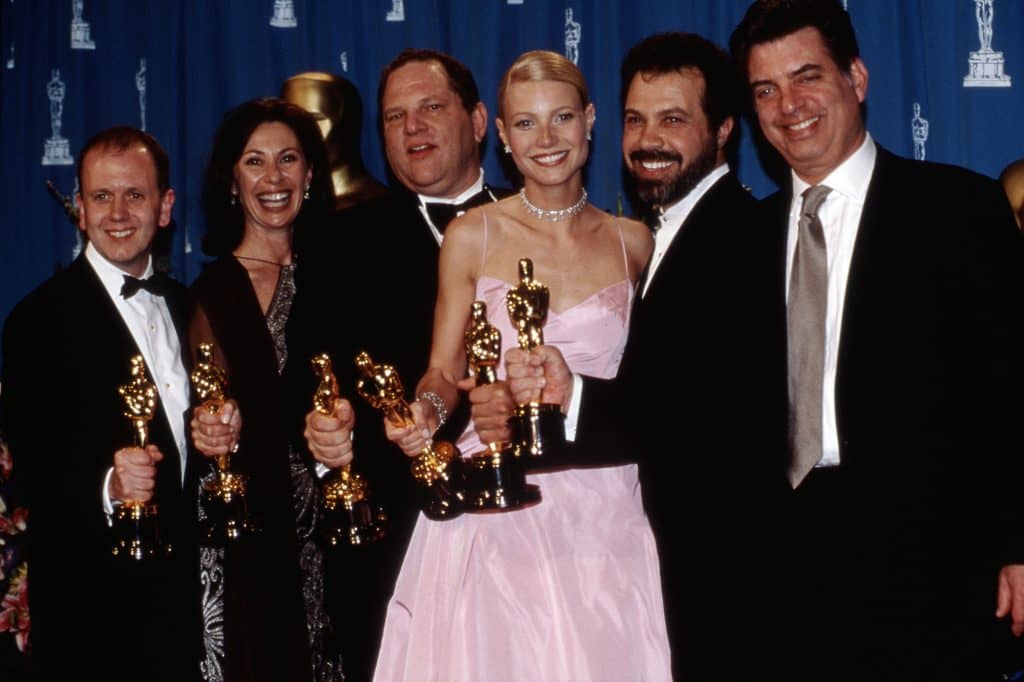The Dark Secrets Behind Winning An Oscar (The Academy) Award: Ah, the Oscars. The glitz, the glamour, and Hollywood’s finest politely maintaining that it was an honor just to be nominated. Millions of people around the world tune in to find out which movies are given the Oscar stamp of approval every year. Still, the nitty-gritty of how Oscar winners are chosen remains to be something of a mystery to the general public.

Who decides who wins an Oscar? Who decides who is nominated? Why do we rarely see foreign or non-European talent recognized at the Oscars? All of these are pressing questions that deserve to be answered with transparency. But be warned – the secrets behind the Oscars might be a lot darker than you expect.
The Academy – The Institution of the Oscars
You’ve heard of the Academy. It’s the first thing Oscar winners thank when they’re clutching their shiny academy award. The Academy is a body of over 9000 people in Hollywood, from actors to directors, to producers, designers who watch all the nominated movies in every category and vote on who they think deserves to win. On paper, the concept sounds fair and democratic.
👉 Do you know there are some people who actually turned down their Oscar Awards?
However, the process of being admitted to the Academy is more biased than the Oscars likes to acknowledge. Any new academy member must be sponsored by two existing members in their area of expertise, and then approved by the Academy’s Board of Governors, who have the final say in who gets to join. Because of these loopholes, the Academy tends to be populated by the most obvious demographic – white men.
In 2015 and 2016, during the #OscarsSoWhite outrage, it was revealed that 93% of the Academy were white, 73% were men, and the median age was 63. So this means that films that specifically appeal to this demographic stand a much higher chance of snagging an Oscar than others. The type of films the academy rewards became so specific over the years that there emerged a term to define these films – Oscar Bait.
What Is An Oscar Bait Movie?
Oscar Bait refers to a certain category of films that are made primarily with appealing to the Academy in mind. There are a lot of things that characterize an Oscar-bait movie – they are usually released towards the end of the award season so that the films will stay fresh in academy members’ memory. They’re often tragic period dramas centered around white male protagonists, films with intricate sets and costumes. They are considered more ‘sophisticated’ than other ‘commercial’ movies.
The patterns of who and what the academy rewards have become so specific that some filmmakers prefer to hack this system rather than focus on producing a sincere work of art. A part of the reason for producing Oscar Bait movies is to boost sales post-award season when there is a lot of hype generated for the Oscar winners. Some films even re-release after the Oscars have aired to capitalize on their nomination or win.

But sometimes, the gap between Oscar Bait movies and genuinely good movies becomes apparent. 2011’s The Iron Lady, a Margaret Thatcher biopic starring Meryl Streep, who took home Best Actress for the film, was faced with rather dismal box office revenues and critical reviews following its release. The formula isn’t perfect, but it certainly exists. But there might be another major hidden factor to Oscar success – campaigning.
The Oscar Campaign Trial
The Oscars work a lot like politics. Just not as obviously. Movie producers, like Harvey Weinstein in particular, are known to campaign for their movies. In addition to the fact that many prominent producers are members of the Academy or well-connected to the Academy, production houses also spend huge amounts of money promoting their Oscar nominees.

In 2016, it was estimated that studios spend anywhere from $3 million to upward of $10 million to lobby Oscar voters. Studios pick their candidates for the academy awards based on “electability” (also see: Oscar Bait) and pour money into ads, mailers, screeners, events, and much more targeting Oscar voters.
Another huge part of Oscar campaigns is the narrative built around the film. Producers push their Oscar candidate films, first and foremost, as important. This goes hand-in-hand with the fact that the Oscars tend to reward serious dramas. But what I mean is the Academy isn’t just considering the film’s own narrative; it is also influenced by the narrative around the film. Moonlight’s win in 2017, as well deserved as it was, could not have happened without the film’s reputation as a fairly independent as well as the backdrop of the #OscarsSoWhite backlash in the previous year.
Just like us, Hollywood loves a good underdog story. Whether it’s a film that was rejected over and over before finally being made, an actor who had always almost won (like Leonardo DiCaprio), or a film that was shunned by critics but enjoyed huge box office appeal, the Academy identifies with these archetypes and rewards them.

The Oscar Campaign Trial can’t be discussed without talking about Harvey Weinstein. A huge influence over the Academy in the 90s, Weinstein was said to “strong-arm” and “bully” other competitors out of the picture. He wrote the playbook for Oscar campaigns. The proof of concept was never more obvious than in 1999’s Best Picture going to Weinstein’s film ‘Shakespeare in Love’ rather than the heavily favored and widely successful ‘Saving Private Ryan.’ All of this brings us to one question: Is the Oscars really about merit?
Does Meritocracy Still Exist?
The funny thing about the Oscars is that despite all of the under-the-table tactics that have become a part of its process, the Academy pretends to see only artistic merit. That’s what we hope to see too when we watch the Oscars. We want the industry experts to decide which films were the best of the year.
But unfortunately, unless a film is promoted and campaigned for, it’s unlikely that it would even appear on the list of nominees. Boots Riley’s 2018 Sci-fi-Comedy runaway hit ‘Sorry To Bother You’ received no Oscar nominations despite having all the makings of a film that usually enjoys Oscar recognition. Riley explained in interviews that neither he nor his team did much promotion or campaigning for the film; therefore, the lack of nominations was obvious.

On the other hand, Parasite’s win in the 2020 Oscars gives us hope – it’s none of the things Oscar baits are made of. The genre tends towards comedy-drama, it’s not an English language film, and it was hardly campaigned for. But its win offers renewed hope that despite all the nepotism built into the Academy, maybe the Oscars do, even if it’s only occasionally, reward some truly exceptional films.



